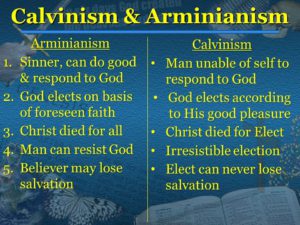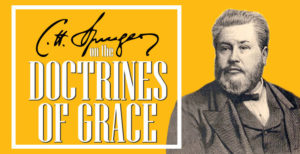 |
| [Autonomous, Libertarian] Free-will doctrine—what does it? It magnifies man into God; it declares God’s purposes a nullity, since they cannot be carried out unless men are willing. It makes God’s will a waiting servant to the will of man, and the whole covenant of grace dependent upon human action. Denying election on the ground of injustice it holds God to be a debtor to sinners, so that if he gives grace to one he is bound to do so to all. It teaches that the blood of Christ was shed equally for all men and since some are lost, this doctrine ascribes the difference to man’s own will, thus making the atonement itself a powerless thing until the will of man gives it efficacy. Spurgeon “A Jealous God” Sermon 502 (1863) |
It is a strange phenomenon that Calvinism, despite its distinguished pedigree in the Reformation, is subject more hostile criticism in the social media than doctrinal deviant cults like Jehovah Witnesses and Mormonism.
Charles Spurgeon, the great Baptist “Prince of Preacher,” had no doubt that such hostility springs from enmity towards the Calvinist proclamation of the sovereign grace of God. “Brethren, in all our hearts there is this natural enmity to God and to the sovereignty of His grace.” “I have known men bite their lip and grind their teeth in rage when I have been preaching the sovereignty of God… The doctrinaires of today will allow a God, but he must not be a King: that is to say, they choose a god who is no god, and rather the servant than the ruler of men.” “The fact that conversion and salvation are of God, is a humbling truth. It is because of its humbling character that men do not like it. To be told that God must save me if I am saved, and that I am in his hand, as clay is in the hands of potter, “I do not like it” saith one. Well, I thought you would not; whoever dreamed you would?”
The media ridiculed Spurgeon as a precocious tyro when he repeatedly opposed Arminianism which was popular among the church hierarchy. The clergy also unanimously judged Spurgeon’s doctrine of election as not only uncharacteristic of contemporary Protestantism but also “in our age, scorned and hated.” Spurgeon readily accepted the charges. “We need not be ashamed of our pedigree,” he says, “although Calvinists are now considered to be heterodox.”
Spurgeon regarded Arminianism as popular because it served to approximate the gospel more to the thinking of the natural man; it brought the doctrine of the Scripture nearer to the mind of the world. The common view of Christianity was accepted by men simply because it was not the teaching of Christ: “had the religion of Christ taught us that man was a noble being, only a little fallen – had the religion of Christ taught that Christ had taken away by His blood, sin from every man, and that every man by his own free-will, without divine grace, might be saved – it were indeed a most acceptable religion to the mass of men.”
However, Spurgeon did not attack Arminianism because he believed those errors meant that a person holding them could not be a Christian; he did not believe any such thing. Indeed he held that a man may be an evangelical Arminian, like John Wesley or John Fletcher of Madeley, and live “far above the ordinary level of common Christians; he knew that a man may be earnest for election and “be as proud as Lucifer”, while other Christians may live humble and useful lives who do not see these truths: “Far be it from me even to imagine that Zion contains none but Calvinistic Christians within her walls, or that there are none saved who do not hold our views.”
In other words Spurgeon saw – what we need to see – that a distinction must be drawn between errors and persons. All that are within the circle of Christ’s love must be within the circle of our love, and to contend for doctrine in a manner which ignores this truth is a rending of the unity of that Church which is His Body. Nevertheless it is equally evident that no man’s beliefs or preaching are above the need of testing and it is the duty of ministers to oppose errors even when they are held by sincere and saintly believers. Spurgeon harmonized these two things when he wrote of John Wesley, “I can only say concerning him that, while I detest many of the doctrines which he preached, yet for the man himself I have a reverence second to no Wesleyan.”
He summarizes his position thus: “In attacking Arminianism we have no hostility towards the men who bear the name and we are opposed not to any body of men, but to the notions which they have espoused.” In our own charitable age it is at once presumed, even amongst evangelicals, that if any man’s views are opposed it is a reflection upon his whole person; but it ought not to be so and we should all be ready to have our views judged by Scripture without taking personal affront. Too often the twentieth-century Church has succumbed to the temptation (which Spurgeon spoke of a century ago) to decry all controversy as ‘party-spirit’ and sectarianism. Speaking of the “incalculable usefulness of controversy to arouse the natural lethargy of the Church”, he declared:
I glory in that which at the present day is so much spoken against – sectarianism. I find it applied to all sorts of Christians; no matter what views he may hold, if a man be but in earnest, he is a sectarian at once. Success to sectarianism; let it live and flourish. When that is done with, farewell to the power of godliness. When we cease, each of us, to maintain our own views of truth, and to maintain those views firmly and strenuously, then truth shall fly out of the land, and error alone shall reign.
 |
| [Armninians say men are] saved by their own consenting to allow Grace to be effectual. We, on the other hand, say no—a man is not saved against his will—but he is made willing by the operation of the Holy Spirit. A mighty Grace which he does not wish to resist enters into the man, disarms him, makes a new creature of him and he is saved. Spurgeon “Laus Deo” Sermon 572 (1864) |
This post is adapted from Iain Murray, The Forgotten Spurgeon 2ed. (Banner of Truth, 1973), pp. 54-66.
Related Post
Charles Spurgeon on Particular Redemption (Excerpts from Two Sermons)
Received this question from a good Christian brother and friend –
Question:
So we should be a “Calminian” 😊!
Sorry, not trying to be flippant Bro Kam Weng. If we cannot fully understand it due to our finite minds trying to grapple with a divine mystery, I think it is ok agree to disagree and not let it divide us and certainly it should not be one side saying to the other “the gospel you preach is defective”.
Please read my response in the next post – “Why not be Calminian (Three grains of Calvinism and two of Arminianism?”